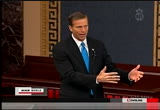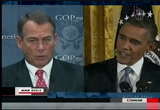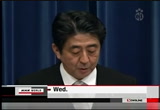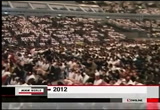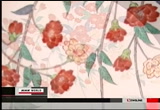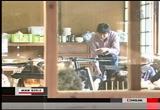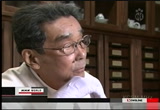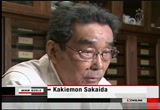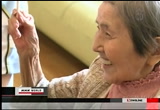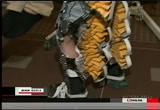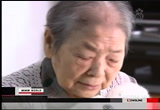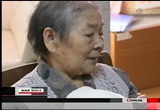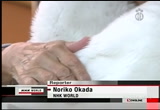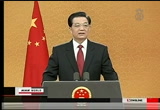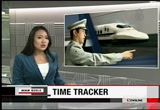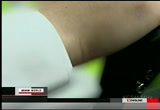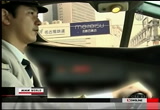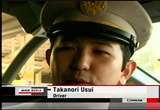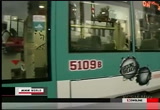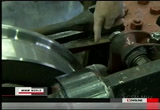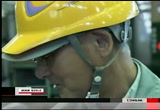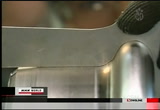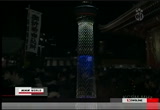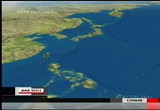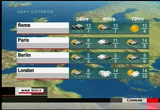tv Journal KCSMMHZ December 31, 2012 5:30pm-6:00pm PST
5:30 pm
hello and welcome back to nhk world "newsline." it's tuesday, january 1, 2013. i'm catherine kobayashi in tokyo. legislators in the u.s. have filed to meet the year end deadline to avert the so-called fiscal cliff. members of the senate agreed to extend tax cuts for middle income earners and raise taxes on the wealthy but the house of representatives decided not to vote on the bill on new year's eve. the house is expected to resume talks quickly in the new year to avert a serious impact from tax
5:31 pm
hikes. president barack obama gave a c year's eve. >> now today it appears that an agreement to prevent this new year's tax hike is within sight. but it's not done. there are still issues left to resolve, but we're hopeful that congress can get it done. >> senate republican leader mitch mcconnell said the two parties had reached an agreement on taxes. they are believed to have agreed to extend tax cuts for middle income earners. people earning more than $450,000 per year will see their taxes go up. that's far higher than obama's original proposal. they have yet to agree to suspend spending cuts. the democrat led senate is expected to pass the bill on new year's eve. the republican led house says it will not vote on the bill before the midnight deadline. members of congress are expected
5:32 pm
to work on a stop gap measure to prevent any serious fiscal impact. the fiscal cliff has become a term many people even outside the financial markets are talking about. if the u.s. economy falls off this cliff, ripple effects are expected. >> reporter: the term fiscal cliff has been making headlines recently. here's a brief explanation. it's a term used to refer to the economic fallout that might occur because of policy divisions in the u.s. congress. if democrats and republicans cannot come to an agreement on resolving the fiscal cliff by year end, sudden tax increases and drastic budget cuts will take effect and would dramatically slow the u.s. economy. let's look into the two main components of the fiscal cliff. first, taxes. democrats want to let tax cuts for the wealthy to expire but republicans are generally
5:33 pm
opposed to the plan. individuals would be hit with huge tax hikes if lawmakers cannot find common ground. second component of the fiscal cliff is large federal spending cuts. the cuts will take effect if the two parties fail to strike a deal. spending would be reduced in areas such as health care which democrats oppose. the defense budget would also be cut. republicans are against that happening. the u.s. congressional budget office says the sudden belt-tightening could cause negative growth by the fourth quarter of 2013. the unemployment rate is expected to rise above 9% if the economy dampens. the european and japanese economies are losing steam. economists are focusing on whether leaders can avoid the fiscal cliff and keep the economy on track.
5:34 pm
u.s. markets have closed for the day. here are the closing figures. new japanese prime minister shinzo abe has given a new year address. he promised to revive the struggling economy. abe said the country is facing several crises. he said deflation, territorial disputes and slow progress in post-disaster reconstruction were the most pressing concerns. he said his cabinet has a mission to put the economy, education and foreign policy back on a recovery track. abe said his government's most pressing challenge is to swiftly
5:35 pm
bring the country out of deflation and to lower the yen against the dollar. he also talked about his visit on saturday to the fukushima daiichi nuclear power plant. abe said his government will allocate funds for the disaster-hit areas as quickly as possible. he said he will tighten control of japan's remote islands and strengthen defense of them. chinese ships and aircraft have repeatedly entered japanese waters and air space around the senkaku islands in the east china sea last year. there's one challenge the prime minister won't be able to tackle any time soon. japan's ageing and shrinking population. new government figures show the number of people coming of age in 2012 matched the record low set the year before. people in japan can vote, drink and smoke when they turn 20. a survey by the internal affairs ministry found 1.22 million japanese reached the milestone in 2012. that's the same figure as a year
5:36 pm
earlier. the lowest since the government began compiling data more than 40 years ago. 20-year-olds now make up less than 1% of the population. the number of people reaching adulthood peaked in 1970. the first post-war baby boomers came of age that year but more than halved since then. administration officials say the figure will continue to fall as birth rates are on the decline. they'd of the family dynasty is preparing to step down. a master craftsman presiding over one of the famous names in japanese porcelain. like any succession this transition from father to son a critical period. 14 generations of tradition hang in the balance. >> reporter: cherry blossoms drooping over a milky pattern.
5:37 pm
it's the work of the head of a porcelain dynasty. he inherited his title 30 years ago. he is now 78. at some point he will pass the prestigious name to his eldest son but he has much to teach, the transition begins many years in advance. pottery production began in the early 17th century. the first generation of porcelains appeared at this time. the family has been the driving force of ceramics ever since. more than 50 people work at the kiln. the family heirs continue to lead their fellow craftsmen. he became sick three years ago.
5:38 pm
little by little his son took on more important work. he started supervising the firing of the kiln but always under the watchful eye of his father. >> translator: you're just imitating. make a contrast with hues. >> translator: i got it wrong. >> translator: in the japanese aesthetic, there's a tremendous breadth and depth in the word "beauty." unless you understand that you won't be a good ceramist. >> reporter: the teacher is strict and the training goes on every day. >> translator: i want him to challenge himself more. it's okay for him to make mistakes and embarrass himself now. >> reporter: while learning from his father, he is also pursuing work on his own designs.
5:39 pm
this piece was created by one of his ancestors hundreds of years ago. he is impressed by the balance and use of empty space. he scrutinizes the designs of this period, measuring and plotting. the future master has started exhibiting his own work. but he knows there is still a long way to go. >> translator: in the future i hope my era will be remembered as the best in the history of my family. i have to work hard. >> translator: there are expectations in japan and all over the world. it's my son's duty to carry on with an acceptable level of work.
5:40 pm
>> reporter: both father and son are working to keep a tradition alive. and the next few years will determine how the prestigious name lives on. >> japanese robots that look after the elderly. it sound like science-fiction but increasingly science fact and with good reason. japanese society is ageing faster than any in the world. over 3 million people suffer from senile dementia. nursing staff and facilities are stretched past capacity. against this backdrop researchers are building new and intelligent machines. >> reporter: a new game is being played at this old people's home in yokohama city, south of tokyo. the residents move their bodies on cue from a robot.
5:41 pm
the exercise helps the brain and fights aging. people from the nursing industry interested in the robot came along to watch. >> translator: coming here today and seeing people talking and dancing with them made me realize that robots have become something very commonplace to old people, too. >> reporter: many of the nursing care robots are japanese inventions. they're catching the eye of facilities overseas. in some countries, they are recognized as medical equipment. ironically, care-giving robots have been slow to catch on in japan. people still expect the functions of caring to be given only by humans, but the situation may be changing. i'm visiting an exhibition for nursing care robots in yokosuka. similar events have been happening across japan.
5:42 pm
they're attracting people who work in social welfare. these people may have noticed the increasing media report of how a robot can help elderly dementia sufferers and nursing home staff. about 20 people with senile dementia live at this home. this robot in the form of a baby seal is fitted with sensors. when stroked or talked to, it responds by blinking. this 92-year-old woman came to the home about a year ago. she has dementia and was already very forgetful. she kept to herself. at night she couldn't sleep. she sometimes took out her anger on the staff.
5:43 pm
>> translator: she became obsessed with going back home. she'd get argumentative, saying, "i have to go and cook the dinner." >> reporter: but a curious thing happened. after caregivers brought in the robots, she began to change. she used to look after her grandchild while the parents, her daughter and her husband, went to work. the robot reawakened such feelings in her. she began treating the seal like her grandchild. little by little, her emotional ups and downs have eased. she gets angry much less often. her nighttime wanderings all but ceased after she began sleeping with the robot in her arms. this has brought huge relief to
5:44 pm
the overnight staff. with the robot, she is also recovering her physical strength. before, she needed assistance to walk even a short way. now she can walk around the facility on her own. the robot helps the home in other ways. >> translator: conversation between people with dementia is usually difficult. but the robot breaks the ice and makes our residents laugh. we find it very useful. >> reporter: around the world, aging and shrinking populations face many challenges. japan's caregiving robots may help ease their way. noriko okada, nhk world,
5:45 pm
yokohama. populous, prosperous, pushing ahead, china's rise brought it wealth, power and problems. an income gap divides its people, pollution threatens their health and disputed seas strain relations with its neighbors. find out the challenges that china faces on "newsline". chinese president hu jintao gave a new year address his final one as the country's leader. he said china will work with other nations for the sake of economic growth and internal stability. the outgoing leader said 2012 was a significant year for china. he referred to the ruling communist party's change in leadership. he stepped down as party general secretary in november handing the role of power. he said the country will promote global economic growth and play
5:46 pm
a responsible role as a major power. hu is scheduleded to retire from politics in march. north korea's state-run television ushered in the new year by praising the achievements of leader kim jong- jong-un. there was a fireworks display. a commentator described kim jong-un's political achievements including the december launch of the rocket. many observers believe the launch was a test of long range missile technology. north korean tv usually only broadcast simple greetings to mark the new year. it's rare to broadcast fireworks displace. japan's bullet trains are famous for being fast and punctual. on the major lines the average delay in a year is measured in seconds. that kind of time keeping requires more than just the latest technology. here's a look at what's going on
5:47 pm
in the driver's cabin. >> reporter: for some people punctuality is a habit. for takanori it's a passion. he has been driving bullet trains for ten years. today he's departing from from osaka to tokyo. the automatic control system set as maximum speed, depending on the spacing between trains. but the computer can't determine the optimum speed to stay on schedule. that is still in the hands of the driver. >> translator: 54 minutes 15 seconds on time. in order to be on schedule i
5:48 pm
calculate the speed by subtracting the distance to the next station from the distance to tokyo station. >> reporter: that number 163 is the distance in kilometers from tokyo station. he uses this number to figure out the exact speed needed to arrive at the next stop on time. no computers for this calculation. it's all done in his head. so far he has stopped at two stations and passed two others. on time to the second. but then -- >> translator: departing 15 seconds late. >> reporter: it took time getting the passengers on and off. he accelerates. he wants to make up for the delay but he has to be careful.
5:49 pm
if he goes too fast he'll trigger the automatic brakes, nudging the shifter that he keeps just inside the speed limit. time check. passing, three seconds late. he makes up the lost time over the next two stations. by the third station he's got train and timetable synchronized again. >> translator: passing on time. >> reporter: with the exception of the two through stations, he has kept precisely to the schedule, all the way to tokyo. >> translator: i was getting worried, but in the end i was able to keep my schedule. >> reporter: his 2 1/2 hour journey is record on a shift
5:50 pm
card. it's all there. speed, acceleration, even brake usage. second by second. on a good day, his card is a record of driving perfection, one his passengers will never see. that's fine with him. his eyes stay fixed on the clock. next stop, hiroshima. the city passed a transport milestone in 2012, 100 years since the first street car went into operation. nhk world's yuki hosaka has been talking to some of the unsung heroes who keep the famous trolleys on track. >> reporter: early morning and hiroshima's street cars start purring out of the shed. the city operates 25 different types of trolleys. they come in all shapes and colors, modern and vintage models.
5:51 pm
they carry 40 million people a year. these engineers have a job of keeping hiroshima street cars old and new on the road. there are 60 skilled technicians in the work shop. this man has one of the most important jobs of all. he makes new components to replace worn out parts. >> translator: we always want to make new components as good as the original ones. >> reporter: on this day, nakahara is fixing equipment that connects the driver's control lever to the brakes. the critical parts is the connecting pin. if there is too much space between the pin and the crank, the brakes won't work properly.
5:52 pm
>> translator: it's still not working right. we need to replace the pins with new ones. >> reporter: the maintenance crew has to make many of the replacement parts themselves. often, the original companies stopped making the components years ago. nakahara gets to work on the pin, sizing up, honing, and sizing up again, skills acquired from almost 30 years on the job. >> translator: it fits the hole exactly. we work hard to get it right because we know how important this part is for the driver to steer safely.
5:53 pm
>> reporter: nakahara is also in charge of supervising less experienced colleagues. today he is coaching yasahira nitta, now in his fourth year. nitta is repairing an old wheel. the outer reach of the wheel is worn down. if it's not repaired, there's a risk the car could jump the tracks. nitta uses a grinder to scrape up the metal. he's trying to restore the wheel's original shape. this work is part machinery, part craft. >> translator: you need to shave off another half a millimeter. >> reporter: with a few stops to check the shape, nakahara steers his understudy to another perfect fit.
5:54 pm
>> translator: when it fits just right, you feel great. >> translator: i get the result i'm looking for just by following his instructions. it's amazing. >> translator: we still have many old cars. so it's important to train younger people how to maintain them. >> reporter: a century of the rural, hiroshima wouldn't be the same without its street cars. back at the shop, they make sure that tradition remains in service. yuki hosaka, nhk world, hiroshima. people in japan are ringing in the new year. many worshippers braved the cold to welcome 2013 at a shrine or temple. thousands lined up at the shrine in sendai.
5:55 pm
the 400-year-old shrine has been designated a national treasure. it was damaged by a massive earthquake in march 2011. workers finished repairing it last summer. the street leading to the shrine was packed with people for the countdown. many were praying for the health of their families or for a faster recovery from the quake. the temple is one of tokyo's most popular destinations. 2 million people visit for the new year holidays and temple leaders were expecting even more people this year. the 400-year-old temple has a new neighbor the tokyo sky tree the country's tallest broadcast tower was lit for the countdown in the olympic colors. the illuminations were in support of tokyo's bid to host the 2020 games. people in sydney were among the first to welcome the new year. the sky erupted in color as the
5:56 pm
clock hit midnight. >> here we are. whoa! >> more than 10,000 fireworks helped give 2012 a dazzling sendoff. an estimated 1.5 million people gathered near the opera house in harbour bridge to see the celebration. now let's take a look at the extended weather forecast for selected cities around the world.
140 Views
Uploaded by TV Archive on

 Live Music Archive
Live Music Archive Librivox Free Audio
Librivox Free Audio Metropolitan Museum
Metropolitan Museum Cleveland Museum of Art
Cleveland Museum of Art Internet Arcade
Internet Arcade Console Living Room
Console Living Room Books to Borrow
Books to Borrow Open Library
Open Library TV News
TV News Understanding 9/11
Understanding 9/11

